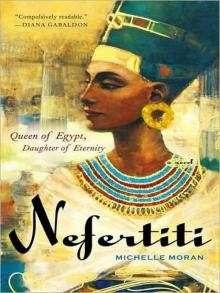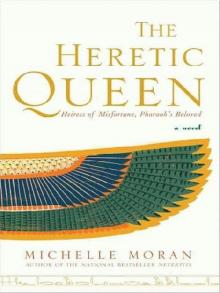- Home
- Michelle Moran
The Heretic Queen Page 9
The Heretic Queen Read online
Page 9
I knew at once that Aloli was right. This was why Woserit had brought us together. “But I am going to that military procession,” I said, not to be dissuaded.
Aloli looked uneasy. “I don’t think the High Priestess will allow it.”
I said nothing more about the procession. We began our lessons, but all I could think about was war, and as soon as our time together was finished, I asked her where I could find the High Priestess. “I can take you to her,” Aloli said. “But she will not be happy to be disturbed. This is her time for writing letters.”
I followed Aloli through the halls of the temple to a pair of heavy wooden doors. “The Per Medjat,” she said.
“She writes in the library?”
“Every afternoon before she sails to the palace.” I hesitated in front of the doors, and Aloli slowly backed away. “You can knock,” she said tentatively, “but do not expect her to answer.” I raised my fist and rapped on the door. When there was silence, I banged again. One of the heavy doors swung open.
“What are you doing here?” Woserit demanded. She had taken off the crown of Hathor, and her hands were stained with sand and ink.
“I have come to make an urgent request,” I said. Woserit looked to Aloli and made no sign of inviting either of us in. “I am guessing she has told you about the procession?”
“Yes,” I said desperately, “and I have come to ask you whether I may attend.”
“Of course not.”
“But—”
“Do you remember when I said there will be times you don’t understand my advice, but that you would need to take it regardless? And do you remember agreeing to that?”
“Yes,” I mumbled.
“Then I expect I won’t have to hear about this again.”
She shut the door. I turned to face Aloli, and I couldn’t keep the tears from my eyes. “If I was his wife, I could be going to war with him.”
“War?” Aloli exclaimed. “You’re a woman!”
“What does it matter? I could be his translator.”
Aloli put her arm around my shoulders. “In a year, my lady, you can see him as often as you choose. It’s not as long as you think.”
“But he will think I am angry with him,” I protested. “He won’t believe that I am forbidden from seeing him because I’m a priestess in training. I’m a princess—there’s nothing a princess is forbidden.”
“Except this. You have given the High Priestess your word.”
“But she doesn’t understand!” I exclaimed.
“When I was in the Temple of Isis, I thought of running away to my mother to tell her how terrible it was. Or of seeing my uncles and begging one of them to take me in. But I didn’t, because if I was caught, I would be banished from the priesthood forever.”
“But isn’t that what you wanted?”
“Of course not! I only wanted to escape from Henuttawy.”
“Then how did you manage?”
“I didn’t. The High Priestess of Hathor did. Woserit heard me perform during a Festival of Opet, and when she came to offer me her compliments, she saw how miserable I was. So she arranged to purchase me from Henuttawy.”
I sucked in my breath. “She bought you like a slave?”
“Henuttawy wouldn’t give me up otherwise.”
“And what did she pay?”
“The same price as seven men. She did it because she knew that my life under Henuttawy was unbearable. So you see, Princess? It would have been a foolish thing for me to have run away. The goddess saw how unhappy I was, and by honoring my vow to Isis, she delivered me from that viper.” She reached across and patted my knee. “You must honor your promise to Hathor, and she will see that you are given your desire as well.”
“But I haven’t made any promise to Hathor.”
“Then honor your vow to Woserit. The High Priestess knows what she is doing.”
THE NEXT morning, I was surprised to see Woserit still in her chamber. She and Paser were crouched, whispering, and when I appeared, they fell silent.
“Princess Nefertari,” Woserit said in greeting. I wondered why she wasn’t in the inner sanctum. “I know how badly you wanted to attend—”
“No,” I said firmly. “I was mistaken.”
Woserit hesitated, as if to take the measure of my words. “I had hoped when you came to this temple, Nefertari, that I would be able to instruct you daily. But with my brother’s war in Kadesh, I am going to be needed in the Audience Chamber more frequently. There will be times I may not see you for days. A month even.”
I looked to Paser, who nodded. “In the mornings, I will still be here, as will all of the priestesses.”
“And they will be able to instruct you as I direct. My hope is that whenever I ask of your progress, I will hear that it is satisfactory.”
“Of course,” I promised, but Woserit did not seem certain.
CHAPTER FIVE
A SWEET SCENT OF FIGS
Thebes, 1283-1282 BC
IN THE TEMPLE of Hathor I fell into a routine. In the dark before sunrise, Merit would wake me, and half asleep I would put on a fresh sheath and light a cone of incense beneath my mother’s shrine. When the cone had burned itself into ashes, I would make my way through the shadowy halls of the temple to Woserit’s chamber. And just as Woserit had promised, I rarely saw her.
Vizier Paser proved to be different from Tutor Paser. He taught me the proper way to greet a Sumerian, and how to know whether a Hittite soldier had made his first kill. “If he has shorn the hair on his face, then he has demonstrated his heroism by slaughtering an enemy.” He wanted me to memorize the customs of foreign people: that Sumerians bury their dead on reed mats and that Assyrians value feathers above any precious stone. We spent entire mornings on politics. “The Hittites are the only power in the world that can rise against Egypt,” Paser insisted. “No other country is more important than Hatti.” So I learned everything I could about Emperor Muwatallis and his son, Prince Urhi; how both men dressed in colorful robes and used swords made of iron. I drew maps of the lands that Muwatallis had conquered, including Ugarit and Syria.
“And the land of Kadesh,” Paser said solemnly, “that once belonged to Egypt. But the Heretic King let the Hittites claim it, and now its wealthy ports—where goods come in from the Northern Sea—all belong to the Hittites. Do you understand what that means?”
“It means that we have to find longer routes for trading ivory, copper, and timber. It means that the Hittites profit from it first. But that is about to change,” I added. “Because Pharaoh Seti and Ramesses are going to take it back!”
Paser allowed himself a smile. “Yes.”
“Is there any news—”
“None.”
I waited for word every night, and on the twenty-seventh day of Choiak, Pharaoh’s army returned from Kadesh. Heralds ran ahead of the men with news of their victory and lists of the dead, and Merit awakened me before sunrise to say that Asha and Ramesses had both survived. From the window of the western sanctuary, I could see the priestesses of Hathor gathering at the quay. Their jeweled belts winked in the sun, and their open-fronted gowns revealed breasts that had been exquisitely hennaed. Aloli joined me at the window. “Aren’t you going to be a part of the celebration?” I asked.
“The High Priestess instructed that I stay here with you.”
“Why? Does she think I’ll run away?”
Aloli grinned slyly. “You wouldn’t?”
“No,” I said quietly. “I wouldn’t.” Below us, the priestesses were now crossing the river, and the bright turquoise sails of Hathor’s ships began to disappear beyond the sycamore groves. I turned to Aloli. “Do you remember the first time I came to this temple?”
“Of course. With your big green eyes you seemed a frightened cat. I didn’t think you were truly a princess.”
I was startled. “Why?”
“Because I knew the princess Nefertari was just fourteen, yet you looked like you were eight or nine.�
��
“But do you remember saying that you had heard about me?”
“Certainly.” Aloli crossed from the window and took her place at the harp. “I heard that you and Pharaoh Ramesses were fast friends. And when news of his marriage came, the court assumed that it would be you.”
“But I was only thirteen! And I’m the niece of the Heretic King.”
Aloli shrugged. “Everyone believed Pharaoh Ramesses would overlook that. No one imagined he would take a harem girl up the dais. So when you came to this temple we thought perhaps you didn’t want to be married.”
“No. I was never asked. As soon as Ramesses was crowned, Henuttawy went to Pharaoh Seti and spoke for Iset.” I told Aloli about Woserit’s theory, that she believed Henuttawy was helping Iset toward the crown in exchange for something. “But what could it be?”
“Power,” Aloli said quickly. “Gold. With both she could build the greatest temple in Thebes, bigger than Hathor’s. Pilgrims would go simply to see its magnificence.”
“Leaving their riches as offerings,” I agreed. I thought of Ramesses and felt my cheeks warm. “There is no one else I can imagine marrying besides Ramesses,” I admitted.
“Then it’s not enough to study harp,” she said. “If you are going to become Chief Wife, you will need to know how to please a man.” Aloli stood, and the silver bangles that jangled when she walked slid down her wrist. “The Temple of Isis was full of Henuttawy’s men,” she explained. “So long as they were wealthy, she welcomed anyone inside. Hittite, Assyrian . . . I learned more than how to please Isis in that temple. You should learn all the secrets that Henuttawy is teaching to Iset.”
I was embarrassed. “Such as?”
“Such as how to satisfy a man beneath his kilt. How to use your mouth to give him pleasure.” My eyes must have betrayed my thoughts because Aloli added, “You will be the difference between a Thebes ruled by Henuttawy and a Thebes ruled by Woserit.”
WHETHER FROM horror at that prospect, or love for Ramesses, I became the perfect student. I was never late, my work was never incomplete, and soon I could have sailed to Assyria and survived on my command of Akkadian alone. Paser didn’t see how this language came to me so quickly, but the truth was, everywhere I went I practiced; in the baths, around the courtyard—even at my mother’s shrine, I prayed to Mut in Akkadian. My harp lessons with Aloli also took on a new intensity, as if the priestess could will her own talent into my hands. With practice I became competent enough that if the queen ever called upon me at court, I would not embarrass myself in front of them. Iset had always prided herself on being talented at music, but now I saw that it was not so difficult with time and patience.
But it wasn’t the harp that kept me late each day in the eastern chamber. One day Merit remarked, “You seem to be enjoying your music, my lady.” I hid my blush behind the feathers of my fan, and the next day when Merit said approvingly, “You stay longer and longer at every lesson.” I finally told her, “That’s because Aloli has been speaking with me about more than just the harp.”
Merit stopped filling my alabaster jar with perfume and came inside from the balcony. “What does she teach you?” she asked flatly.
I put down my reed pen. “Other things. Such as what I should do on my wedding night.”
Merit gave a sharp cry.
“I have to know everything! Iset does,” I added quickly.
“You are not some girl from the harem!”
“No. I am the princess from a family that’s been erased from history. You know as well as I do what it will mean if I become Chief Wife. My family’s name will be rewritten in the scrolls. It will save my family, and it will save us all from Henuttawy. Can you imagine a Thebes where Henuttawy is as powerful as the queen?”
“But for the Priestess Aloli to teach you such things—”
“Why not, if they will keep us safe? If it will keep my mother’s name alive?” I glanced at my broken shrine. Although the court sculptor had done his best, I could still see the thin line where the goddess’s neck had been broken from her body. “You will always be my mawat,” I promised. “But I had another mother who gave her life for me. And what have I given her? What has Egypt given her? As Chief Wife I could make sure that she is never forgotten, that we are never forgotten,” I corrected. “My family ruled Egypt for more than a hundred years and there’s not a single mortuary temple to remember them by! But I could build one in the hills for you, and for my parents.” A warm wind blew the sweet scent of figs from the sycamore trees, and I inhaled. Merit always said that my mother had loved their smell. “There are so many reasons to become Chief Wife. But what if Ramesses doesn’t love me?”
Merit’s face softened. “He has always loved you.”
“As a sister,” I protested. “But what if he can’t love me as a wife?”
WHEN THE season of Shemu came, the court prepared for its annual progress north to the palace of Pi-Ramesses, where the suffocating windless heat of Thebes could be relieved by the ocean breezes. It was the first time I wasn’t going to sail with the flotilla of brightly painted ships or stand on a deck with Pharaoh’s golden standards snapping above me in the warm Payni sun. I stood on the balcony of my chamber one day and imagined the world sailing away from me with only Tefer left for company. And even he wasn’t much good, spending all his time chasing mice in the fields. He didn’t need me. No one needed me.
“What’s wrong with you?” Merit challenged from the door. “Every afternoon you come out here. These groves haven’t changed since yesterday.”
“I’m missing everything! When Thoth comes and a new year begins, I’ll miss the Feast of Wag, too.” Wag is the only night when a person’s akhu can return to the land of the living and enjoy the earthly food that’s presented to them.
But Merit shook her head slyly. “I don’t believe you will miss the feast. Yesterday, I saw the High Priestess while you were practicing harp. She said that in two months you will have been away from court for an entire year, and that soon . . .” Merit paused for effect. “You may be ready to return.”
ON THE tenth of Thoth, Merit shook me out of bed. “My lady, the High Priestess is waiting!”
I sat up and wiped the sleep from my eyes. “What?”
“You are not to study with the vizier today. The High Priestess wants to see you instead!”
We rushed to the mirror, and I sat patiently while Merit applied my paint. “We will use the malachite,” she determined, and opened the jar of expensive green powder. I closed my eyes while she applied it to my lids, and she spent extra time outlining my eyes with kohl. When Merit took my wig from its box, I saw that she had added green faience beads. “How—”
“For the occasion,” she said eagerly.
In all the many months since I first entered the Temple of Hathor, Woserit had rarely seen me. Merit hennaed my nails with a brush meant for kohl, and when she gave me my gown I saw that it was new. I stood, and Merit sucked in her breath. “You are a woman,” she said, as if she could hardly believe it. She narrowed her small eyes as she studied my face, my gown, my nails. When she came to my sandals, her face smoothed itself out and she said frankly, “You are ready.” Her voice choked with tears and she embraced me tightly. “Good luck, my lady.”
“Thank you, mawat.” I pulled away to look her in the eyes. “Thank you,” I said again. “Not just for coming here with me but . . . but for everything.”
Merit straightened her shoulders. “Go. Go before she changes her mind!”
Woserit’s chamber was not far from mine, but even so, the walk had never felt so long. I glanced up at the painted walls with their images of Hathor and Ra and wondered if this would be one of the last times that I would ever see them. At her door, a servant bowed. “The High Priestess is waiting for you, my lady.”
She opened the door and inside, Woserit was sitting at her table, surrounded by flowers for Thoth and the new year. The bright blooms had been arranged in faience vases, and the lilies
perfumed the entire chamber. She looked up, and when she saw me, the expression on her face went from one of deep surprise to pleasure.
“Nefertari?” She stood from behind her table and came over to me. “Look at your cheeks,” she gushed. “They’ve filled out! And your eyes . . . they’re absolutely stunning.” She made me turn around a first time, then a second, and the third time she exclaimed, “Look how you’ve changed.” She reached over and pinched the back of my gown so that she could see the outline of my waist and breasts. “Enough of these shapeless sheaths,” she announced. “I want Merit to measure you for new gowns. You have grown into a woman while I was busy! When Iset gets big and fat with Ramesses’s child, you will still be light and beautiful,” Woserit promised. “And you will never complain. I can promise you, Ramesses will grow tired of her whining.”
“He doesn’t love her?” I asked quickly.
Woserit raised her brows. “I didn’t say that.”
“But what does he like about her if she whines?”
“Oh, she can be charming when she wants, and she’s exceptionally beautiful. But her charm and beauty will be a lot less appealing once he has you to compare her with eight days from now.”
“On the Feast of Wag?” I exclaimed.
Woserit smiled. “Yes. I think we are ready.”
CHAPTER SIX
THE FEAST OF WAG
1282 BC
AT THE END of our lesson on the eighteenth of Thoth, Paser put down his reed pen and asked, “Are you prepared for the feast tonight?”
“Yes.” I tried to hide my excitement. “My nurse has prepared an offering bowl of food for Pharaoh Seti’s temple, and another bowl—”
“I don’t mean food,” Paser interrupted. And there was irony in his voice when he said, “I’m sure Pharaoh’s akhu as well as yours will be very happy with the offerings you bring them. What I’m wondering is whether anyone has prepared you for the shock of visiting the court. Especially when you won’t be remaining there.”

 Madame Tussaud: A Novel of the French Revolution
Madame Tussaud: A Novel of the French Revolution Cleopatra's Daughter
Cleopatra's Daughter Rebel Queen
Rebel Queen The Second Empress: A Novel of Napoleon's Court
The Second Empress: A Novel of Napoleon's Court Mata Hari's Last Dance
Mata Hari's Last Dance Nefertiti
Nefertiti The Heretic Queen
The Heretic Queen The Egyptian Royals Collection
The Egyptian Royals Collection Cleopatra’s Daughter: A Novel
Cleopatra’s Daughter: A Novel The Second Empress
The Second Empress Madame Tussaud
Madame Tussaud